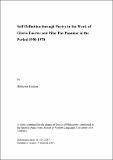Files in this item
Self-definition through poetry in the work of Gloria Fuertes and Pilar Paz Pasamar in the period 1950-1970
Item metadata
| dc.contributor.advisor | Dennis, Nigel | |
| dc.contributor.author | Ten Hacken, Hilde | |
| dc.coverage.spatial | vi, 279 | en |
| dc.date.accessioned | 2008-02-18T15:31:03Z | |
| dc.date.available | 2008-02-18T15:31:03Z | |
| dc.date.issued | 2007-11-30 | |
| dc.identifier.uri | https://hdl.handle.net/10023/421 | |
| dc.description.abstract | Based on a comparative method of enquiry, this thesis analyses the process of self-definition expressed in the work of Gloria Fuertes (Madrid, 1917-1998) and Pilar Paz Pasamar (Jerez de la Frontera, 1933) as individual alternatives to the collective ethos and literary practices promoted within the patriarchal society of Franco’s Spain. Recognizing the poets’ cultural and socio-political context as determining factors in their experiences as women and poets, and therefore in their outlook and poetics, this context and how it is reflected in their poetry provides the starting point (Chapter 1). Both poets acknowledge that writing poetry can provide them with a metaphorical space of freedom that enables them to develop their identity and explore their preoccupations. Therefore, their thoughts about poetry provide an important theme that occurs in the poetry of both (Chapter 2). Closely related to this is the link they establish between poetic inspiration and the divine, which in the case of Pilar Paz Pasamar leads to the attempt to use the special qualities of poetic language to refer to a universal truth that she is aware of and which transcends the capabilities of language, while Gloria Fuertes regards poetry as a divine gift that can provide solace and is ultimately able to improve the world (Chapter 3). The fourth chapter focuses on specific elements of the two poets’ work that reveal the distinctive mechanisms of self-construction they develop. The section on Fuertes considers humour as a survival strategy that enables the poet to reach out to her readership and emphasize her focus on the here and now, while the discussion on Paz’s work looks at how the use of sea imagery allows her to convey abstract experiences based on introspection. Thus, it is argued that their poetry reflects the different strategies the two women develop – based on integration in the case of Fuertes and a more separate position in the case of Paz – to define themselves in relation to their world. | en |
| dc.format.extent | 706760 bytes | |
| dc.format.mimetype | application/pdf | |
| dc.language.iso | en | en |
| dc.publisher | University of St Andrews | |
| dc.subject | Gloria Fuertes | en |
| dc.subject | Pilar Paz Pasamar | en |
| dc.subject | Spanish post-war poetry | en |
| dc.subject | Women's writing | en |
| dc.subject.lcc | PQ6177.H2 | |
| dc.subject.lcsh | Spanish poetry--Women authors--History and criticism | en |
| dc.subject.lcsh | Spanish poetry--20th century--History and criticism | en |
| dc.subject.lcsh | Fuertes, Gloria--Criticism and interpretation | en |
| dc.subject.lcsh | Paz Pasamar, Pilar, 1933- --Criticism and interpretation | en |
| dc.title | Self-definition through poetry in the work of Gloria Fuertes and Pilar Paz Pasamar in the period 1950-1970 | en |
| dc.type | Thesis | en |
| dc.type.qualificationlevel | Doctoral | en |
| dc.type.qualificationname | PhD Doctor of Philosophy | en |
| dc.publisher.institution | The University of St Andrews | en |
This item appears in the following Collection(s)
Items in the St Andrews Research Repository are protected by copyright, with all rights reserved, unless otherwise indicated.

